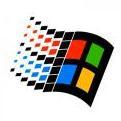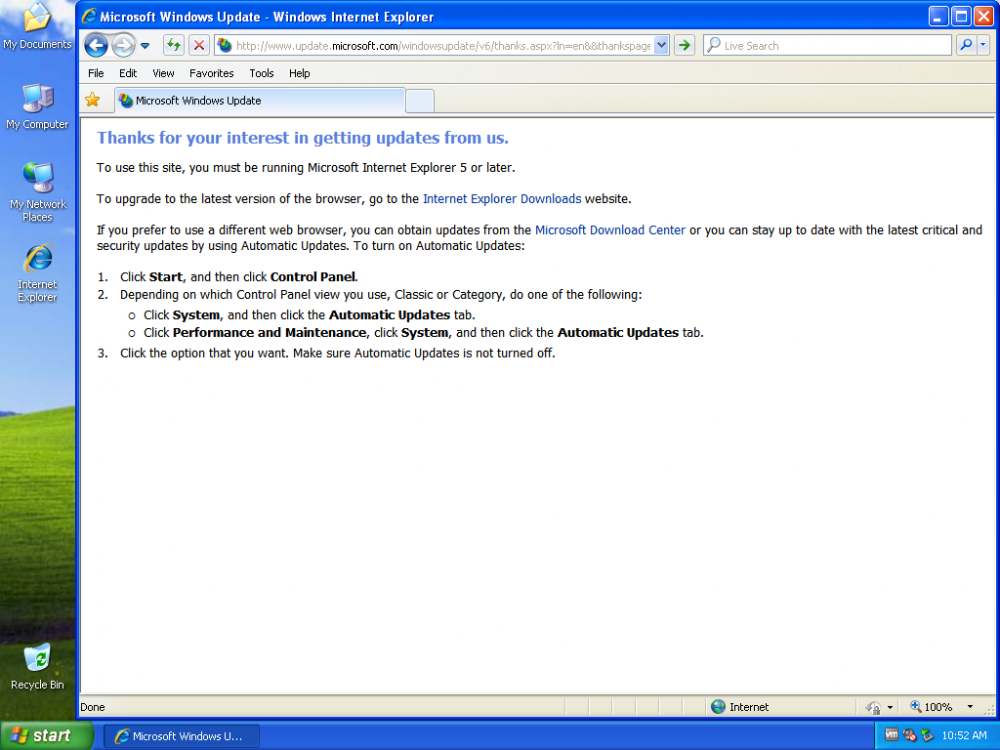Content Type
Profiles
Forums
Events
Everything posted by cc333
-
I wish someone could bring back the old toolbar-style interface from XP and older. This is something no one seems to have been able to do yet, but I'm sure it's possible. c
-
I have been using my twice rebuilt P4 machine (2.8 GHz Northwood, 2 GB RAM, quad boot Windows 98 SE, Windows 2000, Windows XP, and Windows 7), off and on, for the past couple of summers while I packed the good stuff in a safe place (because I live in hot and dry California never know if/when our house, and everything contained therein, will be damaged or destroyed by a fire or earthquake). Browsing is remarkably pokey compared to a modern machine, but surprisingly, everything works more or less fine, just slower (not 5 minutes slow, more like a few seconds here and there, which do add up and require some patience, but not so much that it becomes unbearable). Aside from that, it's as fast (slow?) as it has ever been, and as long as I use period-appropriate software on it (basically, anything up to about 2008 or so), it can do pretty much anything I want (about the only thing it can't do well is Youtube, but I don't care because I usually use it mostly for streaming music, thus making video quality more or less irrelevant). I have a PC with one of these in it that I recently rebuilt, and it runs XP really well (much better than my P4). It's good to know that I can run 8.1+ on it if I *really* wanted to (I don't), but I want to keep it as is because it works. c
-

Share your Microsoft Windows Vista Experience!
cc333 replied to Win10-Hater's topic in Windows Vista
Well, OK. I think I'm misremembering, and it did come with 1 GB, not 512 MB. Nevertheless, it *should've* been fast, but for some reason, it wasn't, and I never could figure out why. All I knew was that XP performed much better on it, so that's what I used. Maybe it was because it was SP0? c -

Share your Microsoft Windows Vista Experience!
cc333 replied to Win10-Hater's topic in Windows Vista
Hopefully this is relevant enough My experiences with Vista over the years have been mixed. My first experience was with an eMachines/Walmart special, with 512 MB of RAM and 3.0 GHz Pentium D, running Vista RTM (SP0); back in early 2007, these specs were considered modest, but decent enough for a budget machine (not woefully inadequate as they seem nowadays ) It was a pretty pokey Vista machine, and actually crashed quite often (including right out of the box the first time we'd ever used it, as I recall!). Once I downgraded it to XP, though, it was much better. My second experience was about a year or so later, when I got a Dell Studio 1737. Same deal, even though Vista was at either SP1 or SP2 by then, and thus much improved, it still didn't run right. It took some doing, but I managed to downgrade that to XP as well, although it still actually didn't help much. I ended up trying Ubuntu on it, and when that ended up being slow and broken too, I wrote off the laptop as being somehow defective and put it away. I still have it somewhere, so I may revisit it at some point and see if I can figure out why it was so flaky. Anyway, so my first experiences with Vista were thus, to put it mildly, lousy. And needless to say, this biased me against it for some time, and I never really wanted to accept it as a viable replacement for XP, which was still quite popular then (I wasn't alone, as many others simply skipped Vista altogether and waited for 7). However, not eager to give up on it completely, I decided to try once again, this time on the nice, speedy Mac Pro I had gotten for my birthday in 2009, and you know what? It was actually pretty good for once! Of course, by then, I had moved on to 7 (and, of course, Mac OS) as my main OS, but still, I could nevertheless say with confidence that I used Vista and it didn't stink because I finally had a machine that was powerful enough to run it well Fast forward to a few years ago when I got two older Dell laptops, a Latitude D620 and a D630, both of which would've been considered decent midrange machines in the late XP and Vista eras, and I decided to try Vista on one of them. The experience wasn't quite as good as it was on the Mac Pro, but it was still extremely decent. Anyway, the TL;DR of this is that my earliest experiences with Vista were lousy, but as hardware improved (along with my ability to upgrade it), my experiences became much better. I've never really felt the need to use it as my daily driver Windows version, primarily because I like XP's UI better, and 7 can run more modern programs that Vista can't, but that doesn't mean I can't enjoy it. c -

Microsoft Edge Chromium keeps closing on Windows Server 2012 R2
cc333 replied to pokeguy's topic in Windows Server
@Dylan Cruz Interesting. I wonder if someone could do something similar with v49 (the last Chrome to run unmodified on XP)? c -

ATTN: People using Mega.nz to share stuff here
cc333 replied to Koishi Komeiji's topic in General Discussion
I dunno. I'm kind of neutral on this particular topic of file hosting sites. However, I will agree that there's lots wrong with the modern internet, particularly the (in my opinion) overemphasis on security. I can understand the need for good security for important things like online shopping, banking, and other such things. But why does every single website need to be forced to use protocols and cipher suites that only a few of the newest browsers (namely Chrome and its derivatives) support?! It's not like they're ALL dealing in sensitive info! For example, I don't see the point in Wikipedia using strict TLS1.2 and 1.3 (at least for the public side); for users logging in to create/edit pages, I suppose it's fine. c -
I have installed the extended kernel on a Vista x64 VM last night, and I tried running the latest Firefox ESR (78.5), and I got the same error as @jns629 at first. Looking at @tamarindojuice's response, I decided to follow his advice to jns629 and patch firefox.exe. And it worked! However, I'm a little concerned that firefox.exe needs to be patched like this with every update, which can get annoying. So, with that in mind, is there a way I can automate the process somehow? I mean, it's of course not hard to do manually, but I'm nevertheless curious. c
-
I haven't been super active here for awhile, but I have been following, and I must say that I'm impressed that Firefox 4x runs now! This would therefore allow roytam1's New Moon 27 (based on Palemoon 27, which I believe is in turn loosely based on Firefox 3x.x) and Nightly Firefox 45 with SSE1 support, both of which are actively maintained and much more up to date than any other browser KernelEx is capable of running. New Moon 28 (based on FF 52, I think) is probably a step too far, but it's a lot closer to being possible than it ever has before! c
-
It may seem harsh, but upon reading the rules, it does actually seem to break rule #1.d: "warez" would seem to qualify as an illegally obtained, illegally hacked copy of Windows XP, and as such, would constitute usage in a manner that violates the license agreement. In other words, I understand where the mods/admins are coming from here. c
-
I tried everything I can think of, short of reinstalling XP from scratch, and, as before, all I keep getting when trying to invoke WU is this: How do I fix it? EDIT: Things I've tried: Uninstalling IE8, and trying the original IE6. No change Force installing WUA 7.6.2600.256. Again, no change Installing and enabling the various POSReady 2009 TLS 1.2 patches and updating/important any relevant registry keys. Nothing Installing manually the Microsoft Update agent. Still nothing Updating root certificates. Fail! c
-
Indeed. I'm using IE8. I wonder if reinstalling the WU client SW and then reapplying the patch would fix it? I think this patch could stand some improvement (the biggest improvement would be to automate the install process, maybe by packaging it into a hotfix/update installer similar to those that MS uses), but it's off to an excellent start! c
-

My Browser Builds (Part 2)
cc333 replied to roytam1's topic in Browsers working on Older NT-Family OSes
@roytam1 Maybe now is a good time to start thinking seriously about branching off completely and establishing your own fork, independent of the Pale Moon developers, and thus largely immune from their meddling? Of course, such would possibly be nontrivial, and someone would still need to maintain it. DISCLAIMER: I'm not a developer! c -
I agree with @max-h, in that whether it is installed in a VM or on real hardware, the only "real" difference between the two is in the drivers (or Guest Additions on a VM). In other words, as far as XP is concerned, the hardware, real or otherwise, doesn't matter too much, so long as compatible drivers are available. c
-
Doesn't this violate forum rules? Probably a case of "get it while you can". I'm certain this won't be online for long. c
-
It'd be lovely if someone could eventually accomplish the same thing for XP (at minimum at least XP 64-bit, since it is vaguely similar to Vista RTM/SP0, and thus probably somewhat more fixable using modified Vista methods than 32-bit XP, which is a rather different beast). Or even better, reverse engineer and implement a 100% compatible clone of the server-side WU/MU v6 engine so it can work indefinitely, which would be much better, because even if SHA-2 support were to be somehow retrofitted into XP (for instance), the relevant XP-related updates will eventually be removed anyway, therefore rendering such support mostly moot. Having a clone of the server-side back end running locally can host a user-defined archive of updates locally (or optionally, some online archive of select official and maybe even unofficial updates) that will always be preserved in some form. c
-

All browser for Windows XP/Vista (always being updated)
cc333 replied to LongLifeXP's topic in Windows XP
I like that they're still explicitly supporting XP, and it isn't an afterthought. c -
I wonder if someone can hack the WU client and add some sort of SHA-2 support? This presumes that the updates are still extant on the WU servers, of course (they should be, as it stands to reason that the update catalog draws from the same source, which still includes updates dating back to Windows 2000 (I just checked, and they're still there as of now; how long it'll remain this way is anyone's guess)). Also, I know it's not 100% relevant here, but why does WU on Vista break when one updates it with the SHA-2 support from Windows Server 2008? I realize it increments the build number form 6002 to 6003, and that is somehow responsible for the breakage, but can't that be worked around to allow WU to work? Or am I misunderstanding something? c
-
Looks like it's too late... c



